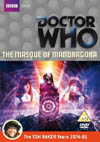DVD Extras include:
The TARDIS gets full marks for visual literacy this time. We start with a nice little tour of the deep interior, followed by a proper introduction to the darker, wood-paneled, second control room. Nifty. Nice for variety. The scanner screen is a definite improvement - the first time it has ever really been up to standard, in fact. Although the usual materialization sound might have been nice to hear accompanying the police box's appearance at the bottom of the Mandragora Helix, it is acceptable not to hear it since we're unsure of the properties of this place, and we get the effect later on this same episode. Lots of nice TARDIS movement for those of us who like it, and demonstrating the interior/exterior relationships nicely enough.
Musically, Dudley Simpson comes up with a few really nice period versions of the Fourth Doctor's Theme here and there, but the score isn't otherwise terribly memorable. Here Simpson begins an absolute monopoly on the program's music for the next four years, which I'm not sure was the best course for the program. As good as Simpson is, the challenge to continue to be fresh, inventive, and memorable with each story is rather steep.
Missed Thematic OpportunitiesAstronomy clashes with Astrology in this story, which sounds like a topic as worthy as science vs. magic. But "Masque of Mandragora" never became as popular as the "The Daemons" (story no. 59), partly because it doesn't capitalize well on this theme. There are the odd interesting scenes of the Doctor countering the views of Hieronymous, but these are too few and far between to carry much weight. Nicely, it is the future of science that is said to be at stake in the story. Many of the best bits concern the simple languaging of ideas: science sounds mystical when reduced to a vocabulary of a simpler time. Then of course there's the classic question of how Sarah can understand Italian. It comes up quite logically, after the Doctor recites a quote in Latin. This also really is the first place the Doctor has taken Sarah where she would know that the inhabitants should be speaking something other than English. Trying to use Sarah's question as evidence that she's been taken over is pure idiocy; the Doctor's suspicions can be more easily triggered by the manner in which he finds her in the corridor unable to give an account of her encounter with the Brethren of Demnos, and by the way in which she stalks around after him. Not that it is of any importance that he prove he knows she's been taken over, because he never does anything about it and lets himself get captured anyway.The story is bogged down by an overindulgence in two very boring elements. The worst is the cult of the Brethren of Demnos. A horde of zombie-like non-characters chanting supplications to some mystic megalomaniacal deliverer as they go about their morbid rituals makes very dull sci-fi viewing. The Doctor's first encounter with them, during the forest fight over Sarah, is ridiculously dialogueless and dispassionate. And that's only the beginning of the clichés, which continue with Sarah going through an overly lengthy sacrifice routine, twice. When the plot isn't dragging itself through this form of padding, it's going through another: the very Shakespearean court intrigue between Prince Giuliano and his uncle Count Federico. It contains no real mystery, as everything is laid out plain as day for the audience, and gone over and over again in great detail for three episodes. It does not really move forward and develop either. It results mostly in scenes of the two parties sitting around and whining about their problems. Once in a while, there's a good bit of running around on the excellent location, and some very playful and safe sword "fighting", but no real plot developments spring from these sequences either. And by the time the final episode gets underway, the two lead villains become nearly non-existent. Count Federico is gone from the start, and Hieronymous is now kept behind a mask where the visual half of Norman Jones' wonderful performance is lost to the viewer. The Mandragora Helix does all its best stuff in the first episode, before resigning itself to cultish rituals. The cult's new powers to zap people are better beam weapons than the usual Hinchcliffe era superimposed blob lasers, but seem less spectacular than that used in "Planet of the Spiders" (story no. 74). And the ending is questionable. It looks as though the cult gets away with wiping out all the important guests at the masquerade ball, with the exception of Sarah, Giuliano, and Marco. How are we to get the impression that the Doctor somehow saved Da Vinci and all the other historical figures?
The EavesdropperIn fact, where the Hartnell and Troughton Doctors have the habitual flaw of going missing for entire episodes at a time, and the Pertwee Doctor has the habitual flaw of becoming the Man of Sleep, Tom Baker's Doctor has a habit of running around and hiding in the shadows, while the guest characters dominate the dialogue without the Doctor's viewpoint having a chance to interact. This dynamic heightens itself in the final episode of "Masque of Mandragora", where, after sneaking around and disappearing, the Doctor's sudden appearance at the end of the concluding events is somewhat anti-climactic.
The Louis Marks Stories Ranked (best to worst): -Day of the Daleks (story no. 60) -Planet of Evil (story no. 81) -Planet of Giants (story no. 9) -The Masque of Mandragora
International Titles:Magyar: "A Mandragóra álarca"Français: (Le masque de Mandragore)Русский: "Маска Мандрагоры"Español: "La Máscara de Mándragora"This story is available on DVD and VHS video:
Comments on this article are welcome. You may contact the author from this page:
|








